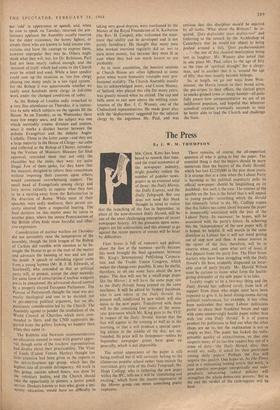The Press
By J. W. M. THOMPSON
Fleet Street is full of rumours and guesses about the Sun at the moment—partly because this week brought the final agreement, between Mr. King's International Publishing Corpora- tion and the Trades Union Congress, which makes the change-over possible. It may be useful, therefore, to set out some facts about the new paper. The Sun will not be a small-page paper like the Mirror: it will have the same page size as the Daily Herald, being printed on the same machines. It will be edited by Sydney Jacobson, who is now editor of the Daily Herald; his present staff, reinfcrced by new talent, will also move to the new paper. Transferred with them will be the remaining four years of the seven- year guarantee which Mr. King gave to the TUC in respect of the Daily Herald. Stories that the Sun will appear in the evening as well as in the morning, or that it will produce a special sport- ing edition in the middle of the day, are un- founded. Its price will be threepence—unless by September newspaper prices have gone up generally, which is not impossible.
The actual appearance of the paper is still being evolved but it will certainly belong to the clamorous popular school rather than imitate the restrained, grey style of the Daily Telegraph. Mr. Hugh Cudlipp, who is fathering the new paper within the IPC, tells'me it will be 'stimulating and exciting,' which from the master-impresario of the Mirror group can mean something pretty explosive. There remains, of course, the all-important question of who is going to buy the paper. The essential thing is that the buyers should be more numerous than the buyers of the Daily Herald, which has lost £2,250,000 in the past three years. It is strange that at a time when the Labour Party is booming in the political popularity polls its official newspaper should be languishing on its deathbed: but such is the case. 1 he essence of the gamble on the Sun is the belief that it will appeal to young people—something which the Herald has ruinously failed to do. Mr. Cudlipp argues that this failure has come about because the paper is inseparably associated with the past of the Labour Party. Its successor, he hopes, will be associated with the party's future. In achieving this the 'independence' of the new paper will, it is hoped, be helpful. It will march in the same direction as Labour but it will not mind getting out of step now and then. A minor interest in the career of the Sun, therefore, will be to observe when, and upon what sort of issue, it first departs from the party line. The Fleet Street doctors who have been struggling with the Daily Herald's ills have evidently diagnosed an incur- able case of party loyalty. Mr. Harold Wilson must' be curious to know what form the health- giving disloyalty of the new paper is to take.
Loyalty ought to be a two-way thing and the Daily Herald has suffered sorely from lack of support from those who might most have been expected to give it. In hotel dining-rooms during political conferences, for example, it has often been noticeable that many Labour politicians prefer to share their breakfast bacon and eggs with some unswervingly hostile paper rather than with 'our own Daily Herald.' It is of course prudent for politicians to find out what the other chaps are up to, but the explanation is not so simple as that. The paper has lacked the indis- pensable quality of attractiveness, so that one suspects many of its too-few readers buy out of a sense of duty—`the Daily Herald, alas,' they would say, -sadly, if asked for their preference among daily papers. Perhaps the Sun will acquire this quality. One hopes so. As The Times said in a welcoming leading article this week, 'a new popular newspaper energetically and inde- pendently advocating radical policies will strengthen the whole democratic process.' But in the end the verdict of the cash-register will tm final.


































 Previous page
Previous page